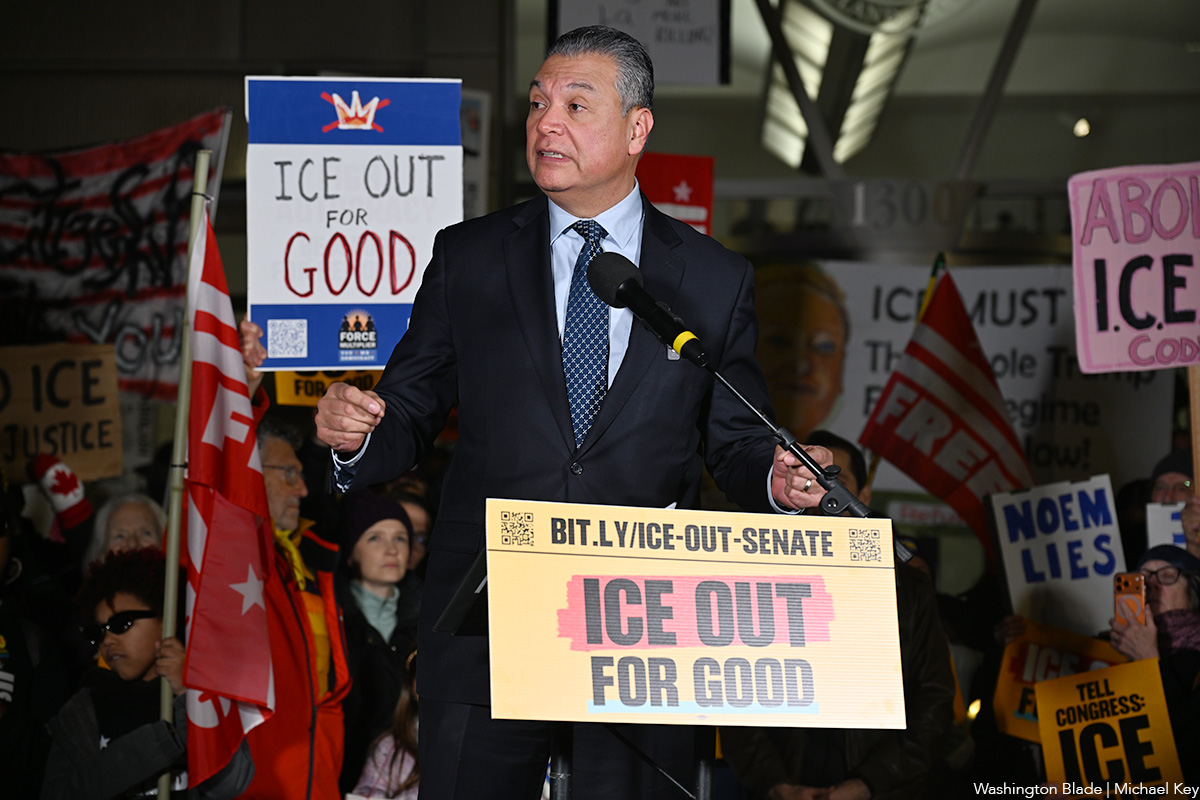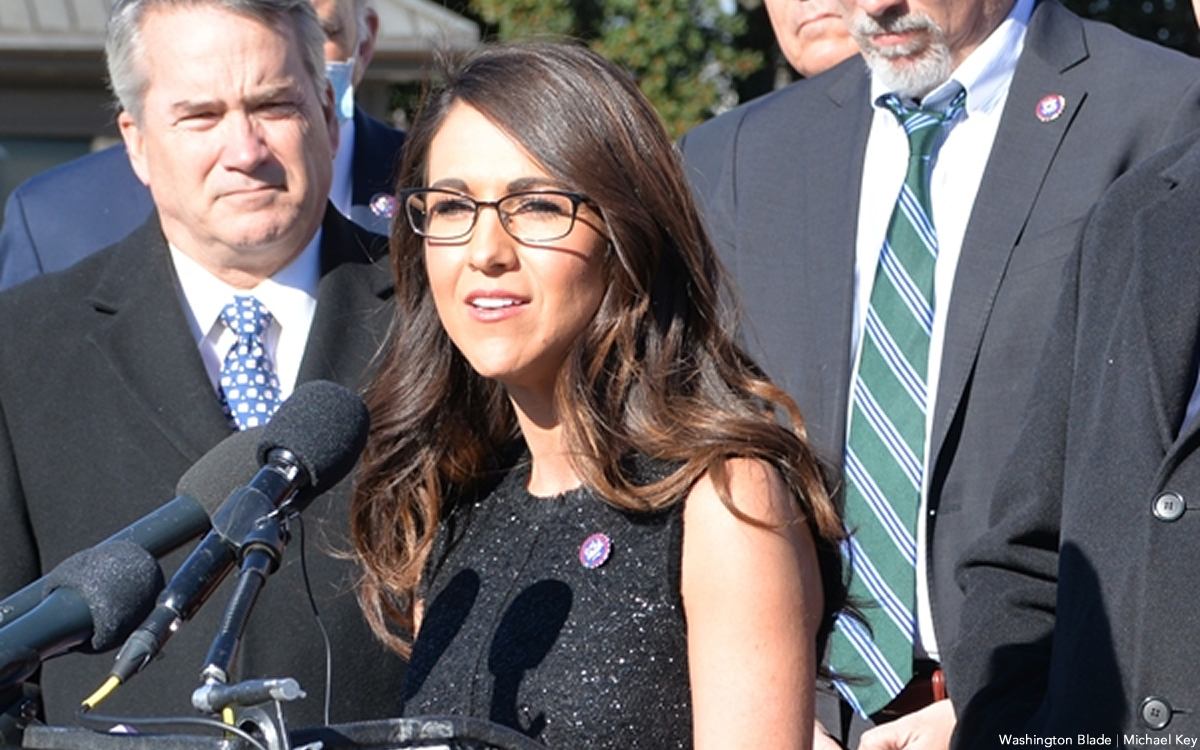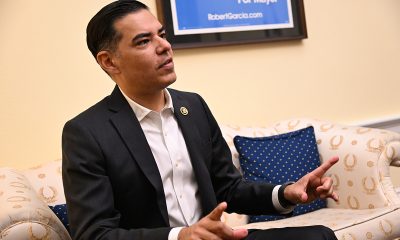Congress
House adjourns without electing a speaker
Republican Leader Kevin McCarthy (Calif.) failed to secure enough GOP votes in three separate ballots on Tuesday.

WASHINGTON – The U.S. House of Representatives adjourned Tuesday evening after failing to elect a new speaker for the 118th Congress in three ballots that saw Republican leader Kevin McCarthy (Calif.) fail to secure sufficient votes from members in the conservative faction of his party.
The chamber will reconvene tomorrow at noon to hold a fourth vote.
Until a speaker is in place, the House will be unable to seat new members or take action with respect to new rules, committee assignments, or legislation.
With Republicans’ narrowly won control over the House, McCarthy needed 218 votes to be elected but won only 203 in the first two rounds and 202 in the third vote, which took place after 5 p.m. on Tuesday evening.
Opposition to McCarthy’s speakership comes from the most conservative Republicans, most belonging to the House Freedom Caucus.
At the same time, some of the caucus’s most conservative members – like Georgia Rep. Marjorie Taylor Greene – were adamant in their support of the Republican Leader.
Not since 1923 has the House failed to elect a speaker with the first floor vote.
Fractures in the GOP caucus were underscored by the fact that McCarthy secured support from more Republicans two years ago, despite having won more seats this time around.
But a group of about 20 Republican members had either publicly declared their opposition to McCarthy’s speakership or declined to signal their support for him leading up to Tuesday’s vote.
Initially, their votes were divided between Rep. Andy Biggs (R-Ariz.), who ran against McCarthy for the gavel, and GOP Reps. Jim Jordan, Jim Banks (Ind.), Byron Donalds (Fla.), and Lee Zeldin (Ny.).
The Republican defectors then lined up behind Jordan in their second and third votes for House speaker, despite Jordan having pledged his support for McCarthy.
Congress
Padilla speaks at ‘ICE Out for Good’ protest in D.C.
ICE agent killed Renee Nicole Good in Minneapolis on Jan. 7

U.S. Sen. Alex Padilla (D-Md.) is among those who spoke at an “ICE Out for Good” protest that took place outside U.S. Customs and Border Protection’s headquarters in D.C. on Tuesday.
The protest took place six days after a U.S. Immigration and Customs Enforcement agent shot and killed Renee Nicole Good, a 37-year-old woman in Minneapolis.
Good left behind her wife and three children.
(Video by Michael K. Lavers)
Congress
White House finds Calif. violated Title IX by allowing trans athletes in school sports
Education Department threatens ‘imminent enforcement action’

The Trump-Vance administration announced on Wednesday that California’s Interscholastic Federation and Department of Education violated federal Title IX rules for allowing transgender girls to compete in school sports.
In a press release, the U.S. Department of Education’s Office of Civil Rights threatened “imminent enforcement action” including “referral to the U.S. Department of Justice” and the withholding of federal education funding for the state if the parties do not “agree to change these unlawful practices within 10 days.”
The agency specified that to come into compliance; California must enforce a ban excluding transgender student athletes and reclaim any titles, records, and awards they had won.
Federal investigations of the California Interscholastic Federation and the state’s Department of Education were begun in February and April, respectively. The Justice Department sued Maine in April for allowing trans athletes to compete and refusing a similar proposal to certify compliance within 10 days.
Broadly, the Trump-Vance administration’s position is that girls who are made to compete against trans opponents or alongside trans teammates are unfairly disadvantaged, robbed of opportunities like athletics scholarships, and faced with increased risk of injury — constituting actionable claims of unlawful sex discrimination under Title IX.
This marks a major departure from how the previous administration enforced the law. For example, the Department of Education issued new Title IX guidelines in April 2024 that instructed schools and educational institutions covered by the statute to not enforce categorical bans against trans athletes, instead allowing for limited restrictions on eligibility if necessary to ensure fairness or safety at the high school or college level.
Sports aside, under former President Joe Biden the department’s Office of Civil Rights sought to protect against anti-LGBTQ+ discrimination in education, bringing investigations and enforcement actions in cases where school officials might, for example, require trans students to use restrooms and facilities consistent with their birth sex or fail to respond to peer harassment over their gender identity.
Much of the legal reasoning behind the Biden-Harris administration’s positions extended from the 2020 U.S. Supreme Court case Bostock v. Clayton County, which found that sex-based discrimination includes that which is based on sexual orientation or gender identity under Title VII rules covering employment practices.
A number of high profile Democrats, including California Gov. Gavin Newsom, have recently questioned or challenged the party’s position on transgender athletes, as noted in a statement by Education Secretary Linda McMahon included in Wednesday’s announcement.
“Although Gov. Gavin Newsom admitted months ago it was ‘deeply unfair’ to allow men to compete in women’s sports, both the California Department of Education and the California Interscholastic Federation continued as recently as a few weeks ago to allow men to steal female athletes’ well-deserved accolades and to subject them to the indignity of unfair and unsafe competitions.”
Congress
Garcia elected top Democrat on the House Oversight Committee
Gay Calif. lawmaker vows to hold Trump-Vance administration accountable

U.S. Rep. Robert Garcia (D-Calif.) on Tuesday was elected top Democrat on the House Oversight Committee in a vote that signaled the conference’s overwhelming support for a newer voice on Capitol Hill who will play a key role taking on President Donald Trump.
With a margin of 150-63, the 47-year-old openly gay congressman defeated U.S. Rep. Stephen Lynch (D-Mass.), alongside U.S. Reps. Jasmine Crockett (D-Texas) and Kweisi Mfume (D-Md.) who exited the race after the House Democratic Steering and Policy Committee backed Garcia.
Serving only since 2023, the congressman has had a remarkably quick ascent leading up to his election this week as ranking member of one of the most powerful House committees, awarded a leadership position serving under House Democratic Whip Katherine Clark (Mass.) and selected as a co-chair of former Vice President Kamala Harris’s 2024 presidential campaign.
Democratic members began jockeying for the top seat on the oversight committee this spring after the late-U.S. Rep. Gerry Connolly of Virginia stepped away amid news that his esophageal cancer had returned. He died in May.
Connolly last year fended off a challenge from one of the most well known House Democrats, U.S. Rep. Alexandria Ocasio-Cortez (N.Y.), though with a narrower margin that signaled intra-party tensions over whether leadership roles should still be awarded based on seniority.
Garcia positioned himself as a bridge between the two camps — a consensus candidate with executive managerial experience as the former mayor of Long Beach. At the same time, particularly since the start of Trump’s second term, the congressman has emerged as one of the most outspoken critics of the new Republican regime.
In a statement on X Tuesday, Garcia thanked his colleagues and promised to “hold Donald Trump and his administration accountable.”
I'm honored to have been elected by @HouseDemocrats to serve as Ranking Member on @OversightDems.
— Congressman Robert Garcia (@RepRobertGarcia) June 24, 2025
We will hold Donald Trump and his Administration accountable for their corruption – and work to make our government more effective for the American people.
Let's get to work.
If Democrats win control of the House next year, the oversight committee will be able to exercise powers that are now available only to Republicans under the chair, U.S. Rep. James Comer (R-Ky.), which include the authority to investigate virtually any matter across the federal government, to issue subpoenas, and to compel testimony.
In the meantime, Garcia on Monday promised that Democrats on the committee would “vigorously fight” Republican Speaker Mike Johnson’s (La.) plans “to dismantle the Government Accountability Office.”
Congress
Padilla forcibly removed from federal building for questioning DHS secretary
Prominent Democrats rushed to defend senator

Democratic U.S. Sen. Alex Padilla of California was forcibly removed from a federal building in Los Angeles after attempting to ask questions of U.S. Homeland Security Secretary Kristi Noem during a press conference on immigration Thursday
The city has been rattled in recent days as protestors objecting to the Trump-Vance administration’s immigration crackdowns clashed with law enforcement and then the president deployed National Guard troops and U.S. Marines, which was seen as a dramatic escalation.
According to a video shared by his office, the senator, who serves as ranking member of the Senate Judiciary Immigration Subcommittee, introduced himself and said, I have questions for the secretary.” After he was pushed out of the room, officers with FBI-identifying vests told Padilla to put his hands behind his back and handcuffed him.
“Senator Padilla is currently in Los Angeles exercising his duty to perform Congressional oversight of the federal government’s operations in Los Angeles and across California,” reads a statement from his office.
“He was in the federal building to receive a briefing with General Guillot and was listening to Secretary Noem’s press conference,” the statement continued. “He tried to ask the secretary a question, and was forcibly removed by federal agents, forced to the ground and handcuffed. He is not currently detained, and we are working to get additional information.”
Democrats were furious, with many releasing strong statements online condemning the actions of law enforcement officers, including California Gov. Gavin Newsom (D), Los Angeles Mayor Karen Bass (D), and the state’s other U.S. senator, Adam Schiff (D).
Human Rights Campaign Chief of Staff Jay Brown also issued a statement: “A sitting U.S. senator should be allowed to ask a Cabinet secretary a question at a press conference — in his own state, on an issue affecting his constituents — without being violently thrown to the floor and handcuffed. Everyone who cares about our country must condemn this undemocratic act. Full stop.”
Congress
51 lawmakers sign letter to Rubio about Andry Hernández Romero
U.S. Rep. Robert Garcia (D-Calif.) spoke about gay Venezuelan asylum seeker

Forty nine members of Congress and two U.S. senators, all Democrats, signed a letter Monday to Secretary of State Marco Rubio demanding information about Andry Hernández Romero, a gay Venezuelan national who was deported to El Salvador and imprisoned in the country’s notorious Terrorism Confinement Center, a maximum-security prison known by the Spanish acronym CECOT
“We are deeply concerned about the health and wellbeing of Mr. Hernández Romero, who left Venezuela after experiencing discriminatory treatment because of his sexual orientation and opposition to Venezuela’s authoritarian government,” the lawmakers wrote. They urged the State Department to facilitate his access to legal counsel and take steps to return him.
After passing a credible fear interview and while awaiting a court hearing in March, agents with U.S. Immigration and Customs Enforcement reportedly transported Hernández out of the U.S. without due process or providing evidence that he had committed any crime.
In the months since, pressure has been mounting. This past WorldPride weekend in Washington was kicked off with a rally in front of the U.S. Supreme Court and a fundraiser, both supporting Hernández and attended by high profile figures including members of Congress, like U.S. Rep. Mark Takano (D-Calif.)
U.S. Rep. Robert Garcia (D-Calif.) was among the four members who wrote to Rubio about Hernández in April. On Friday, he spoke with the Los Angeles Blade before he and his colleagues, many more of them this time, sent the second letter to Rubio.
“There’s a lot of obviously horrible things that are happening with the asylum process and visas and international students and just the whole of our value system as it relates to immigration,” he said, which “obviously, is under attack.”
“Andry’s case, I think, is very unique and different,” the congressman continued. “There is, right now, public support that is building. I think he has captured people’s attention. And it’s growing — this is a movement that is not slowing down. He’s going to be a focal point for Pride this year. I mean, I think people around the world are interested in the story.”
Garcia said he hopes the momentum will translate to progress on requests for proof of life, adding that he was optimistic after meeting with Hernández’s legal team earlier on Friday.
“I mean, the president, Kristi Noem, Marco Rubio — any of these folks could could ask to see if just he’s alive,” the congressman said, referring to the secretary of Homeland Security, whom he grilled during a hearing last month. ICE is housed under the DHS.
“People need to remember, the most important part of this that people need to remember, this isn’t just an immigration issue,” Garcia noted. “This is a due process issue. This is an asylum case. We gave him this appointment. The United States government told him to come to his appointment, and then we sent him to another country, not his own, and locked him up with no due process. That’s the issue.”
Garcia said that so far neither he nor his colleagues nor Hernández’s legal team were able to get “any answers from the administration, which is why we’re continuing to advocate, which is why we’re continuing to reach out to Secretary Rubio.”
“A lot more Democrats are now engaged on this issue,” he said. U.S. Sens. Adam Schiff and Alex Padilla, both from California, joined Monday’s letter. “The more that we can get folks to understand how critical this is, the better. The momentum matters here. And I think Pride does provide an opportunity to share his story.”
Asked what the next steps might be, Garcia said “we’re letting his legal team really take the lead on strategy,” noting that Hernández’s attorneys have “already engaged with the ACLU” and adding, “It’s very possible that the Supreme Court could take this on.”
In the meantime, the congressman said “part of our job is to make sure that that people don’t forget Andry and that there is awareness about him, and I think there’s a responsibility, particularly during WorldPride, and during Pride, all throughout the month — like, this is a story that people should know. People should know his name and and people should be aware of what’s going on.”
Congress
Garcia confronts Noem over gay asylum seeker ‘forcibly removed’ to El Salvador
Andry Hernández Romero is makeup artist from Venezuela

California Congressman Robert Garcia on Wednesday asked Homeland Security Secretary Kristi Noem about the well-being of a gay asylum seeker from Venezuela who the U.S. “forcibly removed” to El Salvador.
The gay Democrat during a House Homeland Security Committee hearing asked Noem whether Andry Hernández Romero is “alive” and whether “we can check and do a wellness check on him.”
“This individual is in El Salvador, and the appeal would be best made to the president and to the government of El Salvador,” Noem told Garcia.
The Trump-Vance administration in March “forcibly removed” Hernández, who asked for asylum because of persecution he suffered due to his sexual orientation and political beliefs, and other Venezuelans from the U.S. and sent them to El Salvador.
The White House on Feb. 20 designated Tren de Aragua, a Venezuelan gang, as an “international terrorist organization.” President Donald Trump on March 15 invoked the Alien Enemies Act of 1798, which the Associated Press notes allows the U.S. to deport “noncitizens without any legal recourse.”
Alvaro M. Huerta, director of litigation and advocacy for the Immigrant Defenders Law Center, a Los Angeles-based organization that represents Hernández, said officials with U.S. Immigration and Customs Enforcement and U.S. Customs and Border Protection claimed their client is a Tren de Aragua member because of his tattoos.
The Washington Blade on April 17 reported Hernández was sent to El Salvador’s Terrorism Confinement Center, a maximum-security prison known by the Spanish acronym CECOT.
Garcia, along with U.S. Reps. Maxwell Alejandro Frost (D-Fla.), Maxine Dexter (D-Ore.), and Yassamin Ansari (D-Ariz.) last month met with U.S. Ambassador to El Salvador William Duncan and embassy staffers in San Salvador, the Salvadoran capital. The lawmakers did not visit CECOT, but Garcia told the Blade that the embassy agreed to ask the Salvadoran government to “see how (Hernández) is doing and to make sure he’s alive.”
Congress
Democratic lawmakers travel to El Salvador, demand information about gay Venezuelan asylum seeker
Congressman Robert Garcia led delegation

California Congressman Robert Garcia on Tuesday said the U.S. Embassy in El Salvador has agreed to ask the Salvadoran government about the well-being of a gay asylum seeker from Venezuela who remains incarcerated in the Central American country.
The Trump-Vance administration last month “forcibly removed” Andry Hernández Romero, a stylist who asked for asylum because of persecution he suffered because of his sexual orientation and political beliefs, and other Venezuelans from the U.S. and sent them to El Salvador.
The White House on Feb. 20 designated Tren de Aragua, a Venezuelan gang, as an “international terrorist organization.” President Donald Trump on March 15 invoked the Alien Enemies Act of 1798, which the Associated Press notes allows the U.S. to deport “noncitizens without any legal recourse.”
Garcia told the Los Angeles Blade that he and three other lawmakers — U.S. Reps. Maxwell Alejandro Frost (D-Fla.), Maxine Dexter (D-Ore.), and Yassamin Ansari (D-Ariz.) — met with U.S. Ambassador to El Salvador William Duncan and embassy staffers in San Salvador, the Salvadoran capital.
“His lawyers haven’t heard from him since he was abducted during his asylum process,” said Garcia.
The gay California Democrat noted the embassy agreed to ask the Salvadoran government to “see how he (Hernández) is doing and to make sure he’s alive.”
“That’s important,” said Garcia. “They’ve agreed to that … we’re hopeful that we get some word, and that will be very comforting to his family and of course to his legal team.”

Garcia, Frost, Dexter, and Ansari traveled to El Salvador days after House Oversight and Government Reform Committee Chair James Comer (R-Ky.) and House Homeland Security Committee Chair Mark Green (R-Tenn.) denied their request to use committee funds for their trip.
“We went anyways,” said Garcia. “We’re not going to be intimidated by that.”
Salvadoran President Nayib Bukele on April 14 met with Trump at the White House. U.S. Sen. Chris Van Hollen (D-Md.) three days later sat down with Kilmar Abrego Garcia, a Maryland man who the Trump-Vance administration wrongfully deported to El Salvador on March 15.
Abrego was sent to the country’s Terrorism Confinement Center, a maximum-security prison known by the Spanish acronym CECOT. The Trump-Vance administration continues to defy a U.S. Supreme Court ruling that ordered it to “facilitate” Abrego’s return to the U.S.
Garcia, Frost, Dexter, and Ansari in a letter they sent a letter to Duncan and Secretary of State Marco Rubio on Monday demanded “access to” Hernández, who they note “may be imprisoned at” CECOT. A State Department spokesperson referred the Blade to the Salvadoran government in response to questions about “detainees” in the country.
Garcia said the majority of those in CECOT who the White House deported to El Salvador do not have criminal records.
“They can say what they want, but if they’re not presenting evidence, if a judge isn’t sending people, and these people have their due process, I just don’t understand how we have a country without due process,” he told the Blade. “It’s just the bedrock of our democracy.”

Garcia said he and Frost, Dexter, and Ansari spoke with embassy staff, Salvadoran journalists and human rights activists and “anyone else who would listen” about Hernández. The California Democrat noted he and his colleagues also highlighted Abrego’s case.
“He (Hernández) was accepted for his asylum claim,” said Garcia. “He (Hernández) signed up for the asylum process on an app that we created for this very purpose, and then you get snatched up and taken to a foreign prison. It is unacceptable and inhumane and cruel and so it’s important that we elevate his story and his case.”
The Blade asked Garcia why the Trump-Vance administration is deporting people to El Salvador without due process.
“I honestly believe that he (Trump) is a master of dehumanizing people, and he wants to continue his horrendous campaign to dehumanize migrants and scare the American public and lie to the American public,” said Garcia.
The State Department spokesperson in response to the Blade’s request for comment referenced spokesperson Tammy Bruce’s comments about Van Hollen’s trip to El Salvador.
“These Congressional representatives would be better off focused on their own districts,” said the spokesperson. “Instead, they are concerned about non-U.S. citizens.”
Congress
EXCLUSIVE: Garcia demands answers on deportation of gay Venezuelan asylum seeker
Congressman’s correspondence was shared exclusively with the Blade

U.S. Rep. Robert Garcia (D-Calif.) is demanding answers from the Trump-Vance administration on its deportation of Andry Hernández Romero, a gay Venezuelan makeup artist who was sent to a prison in El Salvador in violation of a federal court order and in the absence of credible evidence supporting the government’s claims about his affiliation with a criminal gang.
Copies of letters the congressman issued on Thursday to Immigration and Customs Enforcement and CoreCivic, a private prison contractor, were shared exclusively with the Los Angeles Blade.
Garcia noted that Hernández, who sought asylum from persecution in Venezuela over his sexual orientation and political beliefs, had entered the U.S. legally, passed a preliminary screening, and had no criminal record.
Pro-bono lawyers representing Hernández during his detention in the U.S. pending an outcome in his asylum case were informed that their client had been removed to El Salvador a week after he failed to show for a hearing on March 13.
Hernández’s family now fears for his safety while he remains in El Salvador’s Terrorism Confinement Center (CECOT), which has a well documented record of human rights abuses, Garcia said.
Additionally, the congressman wrote, while experts say Tren de Aragua does not use tattoos as identifiers, the “primary evidence” supporting Hernández’s deportation based on his supposed links to the transnational Venezuelan gang “appears to have been two crown tattoos labeled ‘Mom’ and ‘Dad,’ which are common cultural symbols in his hometown.”
The determination about his links to or membership in the organization was made by a CoreCivic employee whose criminal record and misconduct as a law enforcement officer led to his termination from the Milwaukee Police Department, Garcia wrote in his letter to the company.
Requesting a response by May 1, the congressman asked CoreCivic President Damon T. Hininger to address the following questions:
- What qualifications and training does CoreCivic require for employees tasked with making determinations about detainees’ affiliations?
- What protocols are in place to ensure that determinations of gang affiliation are based on credible and corroborated evidence?
- How does CoreCivic oversee and review the decisions made by its employees in such critical matters?
- What mechanisms exist to prevent and address potential misconduct?
- What is the nature of CoreCivic’s collaboration with ICE in making determinations that affect deportation decisions? Are there joint review processes?
- What background checks and ongoing assessments are conducted for employees involved in detainee evaluations, particularly those with prior law enforcement experience?
- What guidelines does CoreCivic follow regarding the use of tattoos as indicators of gang affiliation, and how does the company ensure that cultural or personal tattoos are not misinterpreted?
In his letter to Tae D. Johnson, acting director of ICE, Garcia requested answers to the following questions by May 1:
- Did ICE personnel independently review and approve the determination made by CoreCivic employee Charles Cross Jr. identifying Mr. Hernández Romero as a member of the Tren de Aragua gang?
- What evidence, beyond Mr. Hernández Romero’s tattoos, was used to substantiate the claim of gang affiliation?
- Under what legal authority are private contractors like CoreCivic permitted to make determinations that directly impact deportation decisions?
- What vetting processes and background checks are in place for contractors involved in such determinations? Are there oversight mechanisms to ensure their credibility and adherence to due process?
- What guidelines does ICE follow regarding the use of tattoos as indicators of gang affiliation, and how does the company ensure that cultural or personal tattoos are not misinterpreted?
Together with U.S. Rep. Maxwell Frost (D-Fla.), Garcia wrote to U.S. Rep. James Comer (R-Ky.) on Tuesday requesting permission to bring a congressional delegation to CECOT for purposes of conducting a welfare check on detainees, expressing specific concern for Hernández’s wellbeing. The congressmen said they would “gladly include any Republican Members of the committee who wish to participate.”
Hernández’s case has drawn fierce criticism of the Trump-Vance administration along with calls for his return to the U.S.
Influential podcaster and Trump ally Joe Rogan spoke out in late March, calling the deportation “horrific” and “a horrible mistake.”
Last week, California Gov. Gavin Newsom (D) sent a letter to Kristi Noem, secretary of the U.S. Homeland Security, which manages ICE, demanding Hernández’s immediate return and raising concerns with the right to due process amid the administration’s crackdown on illegal immigration.
Hernández “was denied the opportunity to defend himself against unsubstantiated allegations of gang involvement or to present his asylum claim,” the governor wrote. “We are not a nation that sends people to be tortured and victimized in a foreign prison for public relations victories.”
Immigrant Defenders Law Center President Lindsay Toczylowski, who is representing Hernández, has not been able to reach her client since his removal from the U.S., she told NBC News San Diego in a report published April 11.
“Under the Constitution, every single person has a right to due process, and that means they have a right to notification of any allegations the government is making against them and a right to go into court and prove that those allegations are wrong if that’s the case,” she said. “In Andry’s case, the government never gave us that opportunity. In fact, they didn’t even bring him to court, and they have forcefully sent him to El Salvador without ever giving us any notice or without telling us the way that we could appeal their decision.”
“CECOT, this prison where no one has ever left, where people are held incommunicado, is a very dangerous place for someone like Andry,” Toczylowski said.
In March, a DHS spokesperson posted on X that Hernández’s “own social media indicates he is a member of Tren de Aragua,” though they did not point to any specific posts and NBC reported that reviews of his known social media accounts turned up no evidence of gang activity.
During a visit to CECOT in March, Time Magazine photographer Philip Holsinger photographed Romero and reported that the detainee plead his innocence — “I’m not a gang member. I’m gay. I’m a stylist.” — crying for his mother as he was slapped and his head was shaved.
Congress
Republican lawmakers demand IOC ban transgender athletes from women’s events
2028 Summer Olympics to take place in Los Angeles

A group of Republican lawmakers have demanded the International Olympic Committee ban transgender athletes from women’s athletic competitions.
The lawmakers — U.S. Sens. Jim Risch (R-Idaho), Mike Crapo (R-Idaho), Jim Banks (R-Ind.), Marsha Blackburn (R-Tenn.), Steve Daines (R-Mont.), Lindsey Graham (R-S.C.), Josh Hawley (R-Mo.), Jim Justice (R-W.Va.), James Lankford (R-Okla.), Tim Sheehy (R-Mont.), and Tommy Tuberville (R-Ala.) and U.S. Reps. Burgess Owens (R-Utah), Lauren Boebert (R-Colo.), Vern Buchanan (R-Fla.), Tim Burchett (R-Tenn.), Dan Crenshaw (R-Texas), Brad Finstad (R-Minn.), Craig Goldman (R-Texas), Mark Green (R-Tenn.), Ashley Hinson (R-Iowa), Mike Kennedy (R-Utah), Nick LaLota (R-N.Y.), Blake Moore (R-Utah), Riley Moore (R-W.Va.), Austin Pfluger (R-Texas), John Rose (R-Tenn.), and Claudia Tenney (R-N.Y.) — made the demand in a letter they sent to IOC President Thomas Bach on Tuesday.
“In the United States, we honor our female Olympians. These athletes, and so many others, have inspired generations of young women around the world to compete and excel. Their legacy underscores the vital importance of fairness in women’s sports at every level of competition,” reads the letter. “Future Olympians are counting on the IOC to protect the opportunities of women and girls to contribute to this proud tradition.”
“To do so, the IOC must base eligibility for women’s athletic competitions on biological sex,” it adds. “Allowing biological males to compete in women’s categories undermines competitive opportunities, safety, and respect for female athletes.”
The IOC in 2021 adopted its “Framework on Fairness, Inclusion and Nondiscrimination on the Basis of Gender Identity and Sex Variations” that includes the following provisions:
• 3.1 Eligibility criteria should be established and implemented fairly and in a manner that does not systematically exclude athletes from competition based upon their gender identity, physical appearance and/or sex variations.
• 3.2 Provided they meet eligibility criteria that are consistent with principle 4 (“Fairness”, athletes should be allowed to compete in the category that best aligns with their self-determined gender identity.
• 3.3 Criteria to determine disproportionate competitive advantage may, at times, require testing of an athlete’s performance and physical capacity. However, no athlete should be subject to targeted testing because of, or aimed at determining, their sex, gender identity and/or sex variations.
The 2028 Summer Olympics will take place in Los Angeles.
President Donald Trump on Feb. 5 issued an executive order that bans trans women and girls from female sports teams in the U.S. The Human Rights Campaign and other advocacy groups criticized Democratic California Gov. Gavin Newsom last week after he said it is “deeply unfair” to allow trans athletes to compete in women’s sports.
The Guardian on Feb. 25 reported the State Department has ordered consular officials “to deny visas to transgender athletes attempting to come to the U.S. for sports competitions, and to issue permanent visa bans against those who are deemed to misrepresent their birth sex on visa applications.” A travel advisory for trans and nonbinary people who are planning to visit the U.S. that the German government issued last week specifically notes the Trump-Vance administration has banned the State Department from issuing passports with “X” gender markers.
The letter notes Trump’s Feb. 5 executive order, and indicates the signatories “stand united with Secretary of State Marco Rubio and President Trump in calling on the IOC to amend its standards and safeguard the opportunities of female athletes on the Olympic stage.”
“We urge you to reaffirm the IOC’s commitment to upholding the integrity of women’s Olympic competitions and ensure that only biological women and girls are allowed to compete in female sports categories,” reads the letter. “The Olympic Games should be a model for integrity in sports, and the next IOC president must firmly defend the rights of dedicated female athletes.”
The Los Angeles Blade has reached out to the IOC for comment.
Congress
Garcia vows not to be silenced amid U.S. Attorney’s inquiry into his criticism of Musk
Congressman received a letter from the U.S. attorney’s office in D.C.

U.S. Rep. Robert Garcia (D-Calif.) is pushing back after President Donald Trump’s interim U.S. attorney for D.C., Ed Martin, disclosed his office’s inquiry into whether the congressman’s remarks about Elon Musk earlier this month constituted a threat against a public official.
“This is completely ridiculous, to essentially threaten me with possible prosecution [and] investigations through the U.S. Department of Justice because I used a metaphor to criticize Elon Musk,” Garcia told The Bulwark’s Tim Miller during an interview on Feb. 20.
At issue is a Feb. 12 appearance on CNN during which, as Martin said in a letter to the congressman’s office, “When asked how Democrats can stop Elon Musk, you spoke clearly: ‘What the American public wants is for us to bring actual weapons to this bar fight. This is an actual fight for democracy.’”
He continued, “This sounds to some like a threat to Mr. Musk—an appointed representative of President Donald Trump who you call a ‘dick’—and government staff who work for him. Their concerns have led to this inquiry.”
Garcia’s comments came just after he participated in the first House subcommittee hearing on Musk’s DOGE, the Department of Government Efficiency, which was established by an executive order issued on the first day Trump took office.
In a statement to the Los Angeles Blade, House Democratic Leader Hakeem Jeffries (N.Y.) said “Rep. Robert Garcia is a thoughtful, hardworking, and law-abiding legislator who serves his constituents and the nation with distinction. House Democrats will not be intimidated by far-right extremists who are determined to weaponize the criminal justice system against Congress.”
Garcia serves on the powerful House Oversight Committee as well as in the Congressional Equality Caucus, as one of its 11 LGBTQ+ co-chairs. In November, he was elected the Democratic Caucus Leadership Representative.
“I’ve talked to a lot of folks, members of the House and others, who have been very supportive.” he said on Feb. 20. “I said, ‘Look, we can’t allow this singling out of me. It’s not really about me, right? This is about silencing critics and critics in Congress.’”
Later in the interview, he added “we’re talking to the appropriate folks, and of course, talking to folks in the Democratic leadership” who understand the broader stakes in terms of “our job” as House Democrats to “be the loyal opposition.”
U.S. Rep. Gerald Connolly (Va.), the Oversight Committee’s top Democrat, also issued a statement condemning Martin’s letter:
“This is a shameful attempt to silence and stifle congressional oversight. Mr. Martin—an organizer, financier, and legal representative for the January 6th insurrection—is weaponizing the Justice Department to carry out the president’s retribution tour.
“This ‘Operation Whirlwind’ is a smokescreen meant to distract from the true intentions of the Trump administration: Silencing criticism and snuffing out any attempt to exercise oversight of their misdeeds and perversion of the law. I can assure you that Congressman Garcia and our fellow Oversight Democrats will not be deterred by these threats, and we will continue to fight to safeguard our democracy and protect the rights of the American people we serve.”
Martin on Feb. 19 announced “Operation Whirlwind,” a new initiative to prosecute threats against public officials at all levels of government, which some critics and legal experts believe is primarily intended as a means of silencing criticism.
In addition to Garcia, Martin has sent letters to the Senate’s Democratic Leader Chuck Schumer (N.Y.) on Jan. 21, Feb. 3, and Feb. 11, indicating plans to review remarks he made in 2020 to see if they constituted unlawful threats against two of Trump’s U.S. Supreme Court nominees, Brett Kavanaugh and Neil Gorsuch.
“I want to tell you, Gorsuch,” Schumer said, “I want to tell you, Kavanaugh—you have released the whirlwind and you will pay the price. You won’t know what hit you if you go forward with these awful decisions.”
The top Senate Democrat was speaking during a rally about the conservative jurists’ potential revocation of decades-old constitutional protections for abortion, which they ultimately did in 2022 with their 5-4 decision in Dobbs v. Jackson Women’s Health Organization.
As detailed by aide to the senator in his response to Martin, “on March 5, 2020, the day after the comments referenced in your letter, Senator Schumer made the following remarks” from the Senate floor:
“Now, I should not have used the words I used yesterday. They didn’t come out the way I intended to. My point was that there would be political consequences—political consequences—for President Trump and Senate Republicans if the Supreme Court, with the newly confirmed Justices, stripped away a woman’s right to choose.
“Of course, I didn’t intend to suggest anything other than political and public opinion consequences for the Supreme Court, and it is a gross distortion to imply otherwise. I am from Brooklyn. We speak in strong language.
“I shouldn’t have used the words I did, but in no way was I making a threat. I never—never—would do such a thing. Leader McConnell knows that, and Republicans who are busy manufacturing outrage over these comments know that too.”
The aide concluded, “As Senator Schumer’s statement on the Senate floor confirmed, the comments were not a threat to physically harm any person. I hope that this clarifying information is helpful.”
Shortly after Trump’s appointment of Martin, the conservative lawyer and activist dismissed pending cases against rioters who sacked the Capitol building on Jan. 6, 2021, fired the prosecutors who were involved, and began investigations into those who brought obstruction charges that were ultimately invalidated by a U.S. Supreme Court decision in June.
Barbara McQuade, a former federal prosecutor who teaches law at the University of Michigan and serves as a legal analyst for NBC News and MSNBC, told the Washington Post she had “never seen anything like these letters from a U.S. attorney,” who would typically assign agents to lead such a probe while abiding the Justice Department’s policy of not confirming or denying the existence of any investigation.
“It seems like a fair inference that these letters are designed more to chill free speech than to seek clarification, as they purport to do,” McQuade added.
Garcia agreed, telling Miller that the effort “could have a chilling effect on other folks that actually want to come out and criticize and oppose” Trump, Musk, the administration, or their allies.
Looking ahead, Martin has “given me, by the way, till Tuesday to respond to this letter,” Garcia noted. When asked about what he planned to do, the congressman said “we’re having some conversations about that” but “what we’re not going to do is stay silent.”
“The lesson here is not to retreat,” he said. “The lesson here is to push harder and continue to let people know they are literally trying to limit free speech.”
Discussing his remarks about Musk during an appearance on CNN on Feb. 20, Garcia said “what’s really critical at this moment, I think, for all of us to understand, is that we should be allowed to speak freely, and we certainly should be allowed to use figures of speech, and anyone that watches that can see that as a figure of speech or a metaphor in the way we’re describing this fight.”
The congressman added, “And it is a fight. This is a fight for democracy.”
-

 Events2 days ago
Events2 days agoMargaret Cho joins headliner lineup for Lambda Legal’s queer comedy night
-

 Television2 days ago
Television2 days agoNetflix’s ‘The Boyfriend’ is more than a dating show
-

 Movies3 days ago
Movies3 days ago‘Cutaways’ and the risk queer cinema forgot
-

 Italy3 days ago
Italy3 days ago44 openly LGBTQ+ athletes to compete in Milan Cortina Winter Olympics
-

 a&e features1 day ago
a&e features1 day agoAngel McCoughtry, “Renaissance Woman”
-

 Movies2 days ago
Movies2 days ago50 years later, it’s still worth a return trip to ‘Grey Gardens’
-

 Sports10 hours ago
Sports10 hours agoBlade, Pride House LA announce 2028 Olympics partnership
-

 Arts & Entertainment8 hours ago
Arts & Entertainment8 hours ago2026 Best of LGBTQ LA Readers’ Choice Award Nominations
-

 Sports7 hours ago
Sports7 hours agoMichael Ferrera is paving a path of safety and liberation for queer athletes






